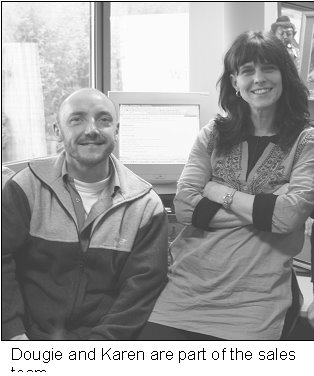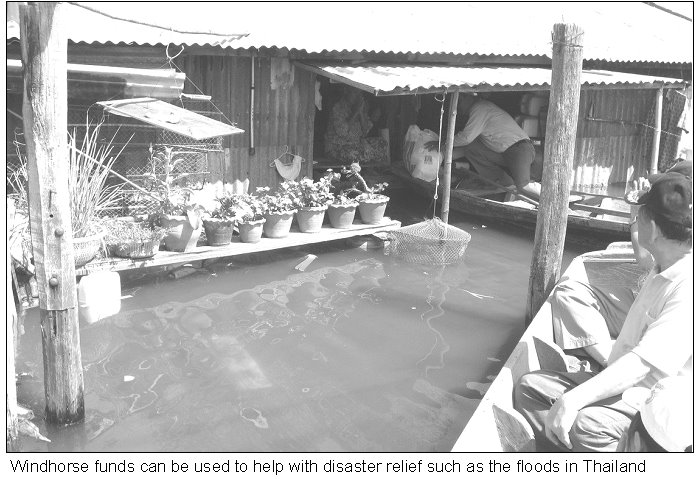2008: Windhorse:Evolutions' 'Year of the Rat'
This is part of a series of four articles on Windhorse:Evolution, the FWBO’s largest and most successful Right Livelihood business, based in Cambridge, UK. The articles will look at the ethos of the business, recent changes and challenges it has faced, the experiences of some individuals working in it, and some of the many projects funded by their current dana.
Most of the articles are taken from the W:E magazine, and are reprinted by permission.
 Vajraketu, Windhorse:Evolution's Managing Director and Chief Buyer gives his reflections on the state of the business.
Vajraketu, Windhorse:Evolution's Managing Director and Chief Buyer gives his reflections on the state of the business.
“A rat year is a time of hard work, activity and renewal. This is a good year to begin a new job, launch a new product or make a fresh start. Ventures begun now may not yield fast returns, but opportunities will come for people who are well prepared and resourceful. The best way for you to succeed is to be patient, let things develop slowly and make the most of every opening you can find.”
This is the Year of the Rat in the Chinese system, the first in the twelve-year cycle. It happens to be an appropriate image for us, because we are entering a new phase. The characteristic of this new phase, I hope, is that we’re going to grow again. After growing between 1986 and 2002, we’ve had five or six years of plateau or consolidation.
During that period of consolidation we made a lot of very necessary changes, particularly during the last couple of years. Firstly in 2002 we had to move into these new premises, which was an enormous undertaking. Then within a period of about twelve months three of the six people who comprised the previous management team moved on and we had to get used to running the business without them. Ratnaghosha devised a new management structure, and Keturaja systematized things and helped bring us to the position we’re in now, with every department in the business in good shape and as well or better managed than it’s ever been.
There is a certain irony here. We’re probably in the best shape ever and yet last year was our least profitable year for at least a decade. Our current estimate is that we’re going to have made about £200-250,000, compared to the previous year, which was something, over £400,000. The reason for that is that sales have plateaued, but our costs have gone up inexorably. Our personnel bill has more than doubled over the last five or six years. That’s the only cloud in the blue sky of the Year of the Rat.
A Platform to Grow
We have a good platform from which we can grow again. The vans, which represent over 50% of our wholesale sales, are in the best shape they’ve been in for years. We’ve got them dynamically managed by Sundara, and we’ve got a keen and strong van team, so if more sales can be got out of the vans, then I’m sure we’ve got the team to do it.
Similarly we’ve got a sales team that’s very motivated, competent and keen. Competition is very stiff and the environment we operate in is quite challenging. Our biggest customer, Internacionale, has started buying direct instead of buying from importers like us, so our business with them is going down and there’s nothing we can do about that except try to replace the lost turnover. In fact we’ve done quite well in that our wholesale sales overall have gone down a little bit, about 4 or 5%, but they’ve gone down less than the amount that Internacionale went down. So if you take Internacionale out of it, despite the economic climate our wholesale sales have gone up. [Since Vajraketu gave this talk Internacionale have gone into administration.]
Our shops are doing quite well in a difficult climate and we’ve got a retail team that feels confident enough to go out and open some more shops. We’ve opened three in the last nine months and we’re planning to open another three or four this year, and probably another four or five next year. We believe we have the infrastructure to support that growth. The warehouse, IT, Personnel and other teams have the capacity to cope with business expansion.
How to Double our Profits
To get our profits up quite considerably, we don’t have to grow that much. Roughly speaking, if we were able to control our costs, sales 10% higher than they are at the moment would double our profits. However, we can’t all simply sit back and let Dougie go out and find £½m worth of orders, and let Abhayakirti go and open 10 shops and the rest of us just reap the rewards. We all need to contribute to this by doing our jobs well or better than we do at present. There’s no one miraculous thing that will double our profits: it’s going to be a lot of small things and a lot of effort, which we can all contribute to.
£1m Target?
On a recent Management Forum two-day meeting somebody proposed the idea that perhaps we should set ourselves a target to make £1m to give away in 3 years’ time. We haven’t really done this in the past. The Management Forum is now going to work out whether that is feasible, and work out a plan.
Doing good things with money
The reason we want to make £1m is because if we made more money we could do more good things. Those of us involved in the FWBO know that there are many projects that would benefit from having more finance.
There is also lot more we can do to support small-scale social projects in the areas where we do business. All of the people who make the goods that we sell are reasonably well paid, but the wider community where they live is often quite poor, and often there’s no real social infrastructure. For example, we support a project in Bali helping disabled people. There are simply no facilities in Bali for disabled people. There is no local authority that organises schools for them or activities for them. They just sit at home.
I am acutely aware that there are many small-scale social projects that we could contribute to. There is a significant number of people in the places where we work who are trying to do good things on a very small budget. We’ve just started doing business with a bag manufacturer in Kolkata (previously Calcutta) who support a small project (http://www.thebridge foundation. org/) that supports educationally bright children from very poor families. It helps them with school fees, books and pencils and it even helps them with food and clothes. They have an annual budget of about £10,000, and we’re about to donate them £1,000 to help them pursue that work. As always this is linked through our suppliers. There are lots of projects like this that we could back if we had more profits.
Working Ethically
Although we will be setting ourselves a target of increasing our profits, just making money isn’t enough for us. We also want to make that money ethically, meaningfully and we want to enjoy making it. These elements should be central to our vision of how we work together.
In terms of ethics, as a company we’re quite good I think but there is always room for improvement. There is one area that we want to develop more, which is of particular interest to me, and that is ethical trading. I’m very proud of what we’ve done to improve the working conditions in some of the companies that we do business with. We have directly improved the living and working conditions of several hundreds of people. We mainly do that by employing an independent auditor, who goes into the factory and produces a report, which our supplier then implements. This all takes up time and money. Sometimes we have to encourage the factory to make the necessary changes, which may involve a stick or a carrot. In addition, if the factory requests it, we employ a consultant to help them take the necessary steps to bring their affairs up to standard. Virtually every case we’re dealing with is quite a small business. They started small, they’ve grown a little bit, but they’re not very sophisticated, so quite often even just getting them to have a payroll system that anyone can understand is a little baffling to them.
For some of our suppliers it’s enough to make the improvements that we want them to make, and that’s it, but a number of our suppliers do more than the minimum necessary to be a good employer: they support social work in their local communities. I’m thinking in particular of Sumiati in Bali, De la Selva in Guatemala, Fok Kwong in China, and Salom in Kenya.
Fok Kwong and Salom were already doing social work before they met us or got any encouragement from us, but both Sumiati and de la Selva were initially inspired to do it by promptings from us. They both now do quite a lot in their local communities. Most of the credit of course goes to them, but we were definitely the catalyst, and I hope we can do more of that as we start to make more money.
Our efforts to be more ethical have led to other people doing the same, and we can be proud of that. We definitely bias our buying as much as we feel we can in the direction of those companies whose ethics chime most closely with ours – about 40-50% of our goods come from companies in that category, and that’s a percentage we would like to increase.
Personal Development
Personal development is not the exclusive preserve of Buddhists, and I hope that everyone will feel that the work environment supports them to gain something in terms of their personal development, perhaps through gaining skills or through work satisfaction.
Finally we want our work to be enjoyable. No one is going to get rich working at windhorse: evolution – I think you’ve probably already worked that out! I would like us all to enjoy it. We at Uddiyana are very, very fortunate. I think it’s worth us counting our blessings. We work in an environment that is physically very pleasant. We are surrounded by nice people, who are all trying to be ethical and positive and kind. There’s no backbiting here – or if there is, it happens behind my back! You almost never hear any bad language. We’re fantastically well fed. If we have any unsung heroes here, it’s our cooks. There are plenty of blessings wherever we look.
That is what I see when I contemplate the Year of the Rat. The business environment in which we are working is not great. The British economy is not in great shape. At the same time the competition we have to face, both in retail and wholesale, is fiercer than it’s ever been in the 20 years I’ve worked here. We’re in good shape to have a go at taking this on, and we can do good things while we’re at it.
Most of the articles are taken from the W:E magazine, and are reprinted by permission.
 Vajraketu, Windhorse:Evolution's Managing Director and Chief Buyer gives his reflections on the state of the business.
Vajraketu, Windhorse:Evolution's Managing Director and Chief Buyer gives his reflections on the state of the business. “A rat year is a time of hard work, activity and renewal. This is a good year to begin a new job, launch a new product or make a fresh start. Ventures begun now may not yield fast returns, but opportunities will come for people who are well prepared and resourceful. The best way for you to succeed is to be patient, let things develop slowly and make the most of every opening you can find.”
This is the Year of the Rat in the Chinese system, the first in the twelve-year cycle. It happens to be an appropriate image for us, because we are entering a new phase. The characteristic of this new phase, I hope, is that we’re going to grow again. After growing between 1986 and 2002, we’ve had five or six years of plateau or consolidation.
During that period of consolidation we made a lot of very necessary changes, particularly during the last couple of years. Firstly in 2002 we had to move into these new premises, which was an enormous undertaking. Then within a period of about twelve months three of the six people who comprised the previous management team moved on and we had to get used to running the business without them. Ratnaghosha devised a new management structure, and Keturaja systematized things and helped bring us to the position we’re in now, with every department in the business in good shape and as well or better managed than it’s ever been.
There is a certain irony here. We’re probably in the best shape ever and yet last year was our least profitable year for at least a decade. Our current estimate is that we’re going to have made about £200-250,000, compared to the previous year, which was something, over £400,000. The reason for that is that sales have plateaued, but our costs have gone up inexorably. Our personnel bill has more than doubled over the last five or six years. That’s the only cloud in the blue sky of the Year of the Rat.
A Platform to Grow
We have a good platform from which we can grow again. The vans, which represent over 50% of our wholesale sales, are in the best shape they’ve been in for years. We’ve got them dynamically managed by Sundara, and we’ve got a keen and strong van team, so if more sales can be got out of the vans, then I’m sure we’ve got the team to do it.
Similarly we’ve got a sales team that’s very motivated, competent and keen. Competition is very stiff and the environment we operate in is quite challenging. Our biggest customer, Internacionale, has started buying direct instead of buying from importers like us, so our business with them is going down and there’s nothing we can do about that except try to replace the lost turnover. In fact we’ve done quite well in that our wholesale sales overall have gone down a little bit, about 4 or 5%, but they’ve gone down less than the amount that Internacionale went down. So if you take Internacionale out of it, despite the economic climate our wholesale sales have gone up. [Since Vajraketu gave this talk Internacionale have gone into administration.]
Our shops are doing quite well in a difficult climate and we’ve got a retail team that feels confident enough to go out and open some more shops. We’ve opened three in the last nine months and we’re planning to open another three or four this year, and probably another four or five next year. We believe we have the infrastructure to support that growth. The warehouse, IT, Personnel and other teams have the capacity to cope with business expansion.
How to Double our Profits
To get our profits up quite considerably, we don’t have to grow that much. Roughly speaking, if we were able to control our costs, sales 10% higher than they are at the moment would double our profits. However, we can’t all simply sit back and let Dougie go out and find £½m worth of orders, and let Abhayakirti go and open 10 shops and the rest of us just reap the rewards. We all need to contribute to this by doing our jobs well or better than we do at present. There’s no one miraculous thing that will double our profits: it’s going to be a lot of small things and a lot of effort, which we can all contribute to.
£1m Target?
On a recent Management Forum two-day meeting somebody proposed the idea that perhaps we should set ourselves a target to make £1m to give away in 3 years’ time. We haven’t really done this in the past. The Management Forum is now going to work out whether that is feasible, and work out a plan.
Doing good things with money
The reason we want to make £1m is because if we made more money we could do more good things. Those of us involved in the FWBO know that there are many projects that would benefit from having more finance.
There is also lot more we can do to support small-scale social projects in the areas where we do business. All of the people who make the goods that we sell are reasonably well paid, but the wider community where they live is often quite poor, and often there’s no real social infrastructure. For example, we support a project in Bali helping disabled people. There are simply no facilities in Bali for disabled people. There is no local authority that organises schools for them or activities for them. They just sit at home.
I am acutely aware that there are many small-scale social projects that we could contribute to. There is a significant number of people in the places where we work who are trying to do good things on a very small budget. We’ve just started doing business with a bag manufacturer in Kolkata (previously Calcutta) who support a small project (http://www.thebridge foundation. org/) that supports educationally bright children from very poor families. It helps them with school fees, books and pencils and it even helps them with food and clothes. They have an annual budget of about £10,000, and we’re about to donate them £1,000 to help them pursue that work. As always this is linked through our suppliers. There are lots of projects like this that we could back if we had more profits.
Working Ethically
Although we will be setting ourselves a target of increasing our profits, just making money isn’t enough for us. We also want to make that money ethically, meaningfully and we want to enjoy making it. These elements should be central to our vision of how we work together.
In terms of ethics, as a company we’re quite good I think but there is always room for improvement. There is one area that we want to develop more, which is of particular interest to me, and that is ethical trading. I’m very proud of what we’ve done to improve the working conditions in some of the companies that we do business with. We have directly improved the living and working conditions of several hundreds of people. We mainly do that by employing an independent auditor, who goes into the factory and produces a report, which our supplier then implements. This all takes up time and money. Sometimes we have to encourage the factory to make the necessary changes, which may involve a stick or a carrot. In addition, if the factory requests it, we employ a consultant to help them take the necessary steps to bring their affairs up to standard. Virtually every case we’re dealing with is quite a small business. They started small, they’ve grown a little bit, but they’re not very sophisticated, so quite often even just getting them to have a payroll system that anyone can understand is a little baffling to them.
For some of our suppliers it’s enough to make the improvements that we want them to make, and that’s it, but a number of our suppliers do more than the minimum necessary to be a good employer: they support social work in their local communities. I’m thinking in particular of Sumiati in Bali, De la Selva in Guatemala, Fok Kwong in China, and Salom in Kenya.
Fok Kwong and Salom were already doing social work before they met us or got any encouragement from us, but both Sumiati and de la Selva were initially inspired to do it by promptings from us. They both now do quite a lot in their local communities. Most of the credit of course goes to them, but we were definitely the catalyst, and I hope we can do more of that as we start to make more money.
Our efforts to be more ethical have led to other people doing the same, and we can be proud of that. We definitely bias our buying as much as we feel we can in the direction of those companies whose ethics chime most closely with ours – about 40-50% of our goods come from companies in that category, and that’s a percentage we would like to increase.
Personal Development
Personal development is not the exclusive preserve of Buddhists, and I hope that everyone will feel that the work environment supports them to gain something in terms of their personal development, perhaps through gaining skills or through work satisfaction.
Finally we want our work to be enjoyable. No one is going to get rich working at windhorse: evolution – I think you’ve probably already worked that out! I would like us all to enjoy it. We at Uddiyana are very, very fortunate. I think it’s worth us counting our blessings. We work in an environment that is physically very pleasant. We are surrounded by nice people, who are all trying to be ethical and positive and kind. There’s no backbiting here – or if there is, it happens behind my back! You almost never hear any bad language. We’re fantastically well fed. If we have any unsung heroes here, it’s our cooks. There are plenty of blessings wherever we look.
That is what I see when I contemplate the Year of the Rat. The business environment in which we are working is not great. The British economy is not in great shape. At the same time the competition we have to face, both in retail and wholesale, is fiercer than it’s ever been in the 20 years I’ve worked here. We’re in good shape to have a go at taking this on, and we can do good things while we’re at it.
Labels: Dana, Right Livelihood, Windhorse




 rss
rss
0 Comments:
Post a Comment
<< Home